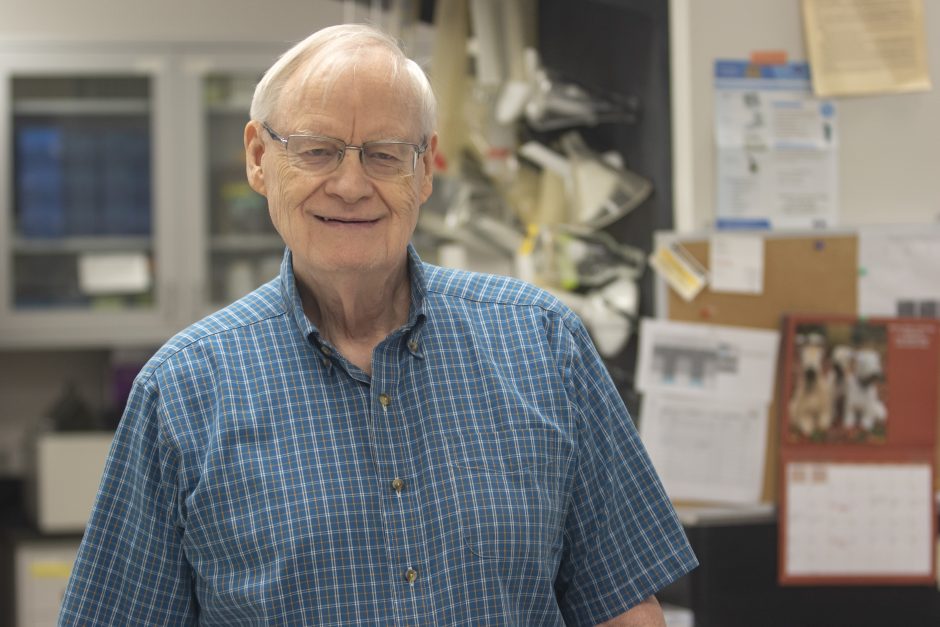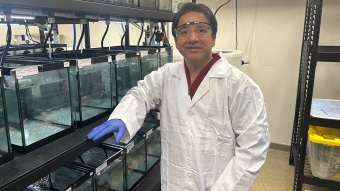Nov. 3, 2022
Contact: Brian Consiglio, 573-882-9144, consigliob@missouri.edu
Today, the University of Missouri announced a $1.5 million gift from the Orthopedic Foundation for Animals (OFA). The gift will help fund a new director of the Canine Molecular Genetics Laboratory in the MU College of Veterinary Medicine, which works on finding causes of genetic diseases in dogs.
“The College of Veterinary Medicine has had an association with the Orthopedic Foundation for Animals for more than 50 years, shortly after it was founded in 1966,” said Carolyn Henry, dean of the MU College of Veterinary Medicine. “For the past two decades, this collaboration has been much more than mutually beneficial, it has meant better health and improved life for countless dogs and the people who love them. Thanks to the generosity of the OFA and the vision of its board, our partnership will continue. Together we will continue providing testing services for veterinarians, breeders and dog owners, while furthering the quest to find the genetic causes of heritable diseases.”

The lab conducts nearly 40 different DNA tests for specific mutations found in various recessive diseases, including degenerative myelopathy, a disease that impacts the spinal cord and leads to dogs losing control of their legs, bladder and bowels.
“Missourians and their pets from all over the state benefit from the research conducted and services provided at the University of Missouri,” University of Missouri Board of Curators Chair Darryl Chatman said. “This gift will support efforts to find the causes of genetic diseases in dogs to improve their health and highlights Mizzou’s values as a tier-1 research, land-grant, AAU, flagship university."
Each year, the lab conducts nearly 9,000 tests for the OFA, dog breeders, veterinarians and dog owners.
“Research at MU has demonstrated how the discovery of the genetic basis for diseases in animals can benefit both animals and humans,” said Mun Choi, president of the University of Missouri. “For example, recent work here at the University of Missouri on a genetic degenerative disease of dogs will also benefit humans who suffer from ALS, or Lou Gehrig’s disease. This gift allows our scientists to continue their groundbreaking discoveries which may lead to new therapeutic and clinical treatments, ultimately leading to better health for millions of animals and people throughout the state and nation.”
The lab currently has about 150,000 samples stored in its freezers, and researchers from around the world request these samples for their own investigations.
“For the past 20 years, the primary mission of our laboratory has been to discover the mutations responsible for heritable canine diseases and to provide veterinarians and dog owners with DNA tests for these mutations,” said Gary Johnson, an associate professor in the MU College of Veterinary Medicine and current director of the Canine Molecular Genetics Laboratory. “I am exceedingly grateful to the Board of Directors of the OFA for their gift to the University of Missouri which establishes the Dr. E. A. (Al) Corley OFA Endowed Program in canine molecular genetics. The endowed program provides a means for our laboratory’s mission to continue after I am too old to lead the laboratory.”
The lab is also involved in researching various types of Batten disease, a class of rare, fatal, inherited disorders of the nervous system. One of the lab’s accomplishments has been identifying gene mutations in dogs that are comparable to the defect in genes that cause the human forms of the disease.
“This gift is a remarkable investment in the future of Mizzou and the College of Veterinary Medicine,” said Jackie Lewis, vice chancellor for advancement. “We’re proud of the work our faculty and the Orthopedic Foundation for Animals have done together, and this gift will allow us to add a quality researcher who will only strengthen this partnership and our university.”
The announcement comes on One Health Day, which highlights the interconnection among people, animals, plants and their shared environment with the ultimate goal of improving health outcomes.



